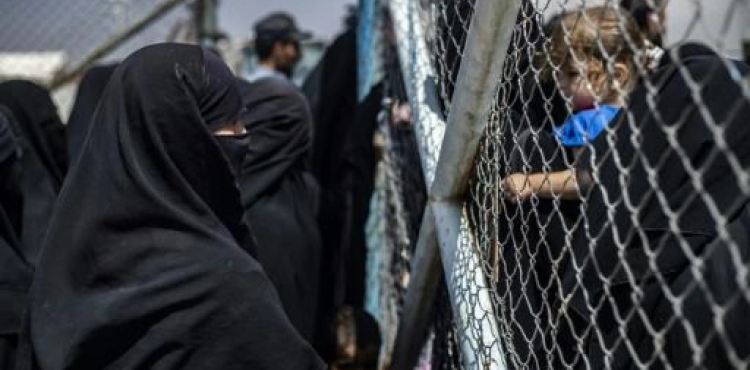Twelve French children and two Dutch children from families of members of an Islamic state organization arrived in France on Monday from Syria, where they were in the custody of Kurdish self-government.
The French Foreign Ministry announced the arrival of the two, all "orphans, isolated and vulnerable," noting that some were sick and malnourished.
The two Dutch children were handed over to representatives of their countries in Paris, according to the same source.
Thousand of foreign nationalities, both jihadists and their families, are burdensome for Kurdish self-management in northern and north-eastern Syria, and one of the most important challenges since the declaration of the elimination of the "caliphate" organized by the Islamic State Organization in Syria and Iraq last March.
A series of deliveries of this kind has been carried out in a number of countries, but they remain limited compared to the large numbers of members of jihadist families living in overcrowded camps in northern and northeastern Syria. However, these operations are a positive step, with the Kurds insisting that the countries concerned be asked to restore their citizens amidst the complacency of those countries, especially the European ones.
The joint head of the Department of External Relations in self-management Abdul Karim Omar announced on his account on Twitter, the extradition of the 12 children, "at the request of the French government," to a delegation from the French Foreign Ministry in the town of Ain Issa in northern Syria, Also delivered two Dutch children.
A Kurdish self-rule official, speaking on condition of anonymity, told Agence France-Presse that among the French children were members of one family, the largest of whom was 10 years old.
The Child Protection Department in France took over the children. They will initially be subjected to a medical examination before being handed over to the Social Services Office, according to the French Foreign Ministry, which indicated that the two Dutch children were also transferred to a French military plane before being handed over to representatives of their country who were waiting in Paris.
At the end of last month, French Foreign Minister Jean-Yves de Villepin said: "Some 450 French nationals are being held by the Kurds or are being held in displacement camps in the areas controlled by the Syrian Democratic Forces, which are formed by an alliance of Arab and Kurdish factions.
France and other countries refuse to restore their citizens from elements of the Islamic state organization detained by the Kurds, and members of their families who are in the camps.
But Paris, which is under pressure from public opinion to resolve the case, has said it will probably be satisfied with the return of orphaned children of French jihadists. In March, for the first time, five orphaned children were recovered.
Another third extradition could be made if other children met the same criteria, according to the French Foreign Ministry.
Attorney Samia Maktoof, who is responsible for French families with children in Syria, said the recent extradition was "a very important step", considering the "safety of these children and that they were at risk of death."
Another lawyer expressed her rejection of these operations, which are conducted by examining each file separately, expressing concern about the fate of "more than 200 French children" who are still in the camps of displacement.
The 12 French children were distributed among the Hol and Rog camps in Hassakeh province, while the two Dutch children lived in Ain Issa camp.
Several camps in the Kurdish-controlled areas of Syria, most notably the Al-Hool camp, house 12,000 foreigners, 4,000 women and 8,000 children from foreign jihadist families, who live in heavily guarded sections. This number does not include Iraqis.
The inhabitants of those camps are a great burden on self-management.
A few countries have received members of jihadist families, such as Uzbekistan, Kazakhstan and Kosovo, in large numbers, while others have received limited numbers, including Sudan, Norway and the United States.
At the beginning of this month, Norway received five children from orphaned families of elements who were part of the organization of the Islamic state. On Wednesday, self-government announced the extradition of two American women and six children to the United States.
Self-management has also begun to repatriate displaced Syrian residents of the Hull camp, which houses 74,000 people, including 30,000 Syrians, to the areas from which they originate.
On the third of this month, 800 women and children from Al-Hool refugee camp fled to Al-Rigga and Taba areas with the help of tribal leaders in these areas.
The camp suffers from a severe shortage of services and its inhabitants live in tragic conditions.
In addition to the camps, hundreds of foreign jihadists who have joined extremist ranks are in the prisons of Kurdish militants.
Observers fear that the prisons and camps will be the ground for the resurgence of the extremist organization that the Syrian Democratic Forces announced on March 23 after they seized control of the last enclave in the east of the country. But its sleeping cells remain a threat to the region.
In neighboring Iraq, foreign jihadists who have been transferred from Syria are being tried. Recently, 11 French nationals have been sentenced to death for belonging to the Islamic state.












